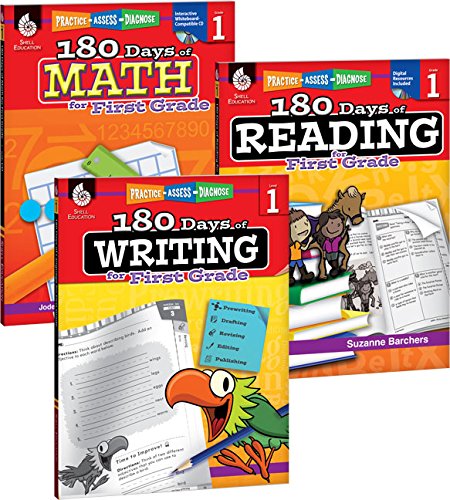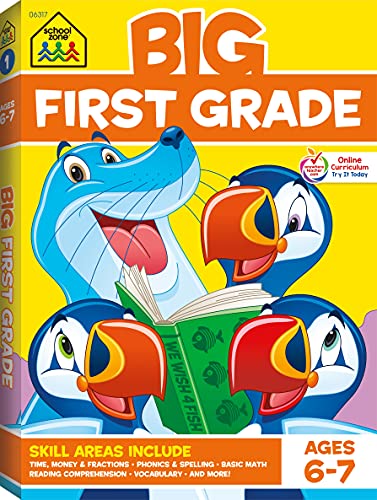The best workbooks for 1st graders are those that are designed for their age group.
The Best Workbooks For 1St Graders
- Summer Bridge Activities K-1 Workbooks, Ages 5-6, Math, Reading Comprehension, Writing, Science, Social Studies, Summer Learning 1st Grade Workbooks With Flash Cards (160 pgs)
- 180 Days of Practice for First Grade (Set of 3), 1st Grade Workbooks for Kids Ages 5-7, Includes 180 Days of Reading, 180 Days of Writing, 180 Days of Math
- Brain Quest Workbook: Grade 1
- School Zone - Big First Grade Workbook - 320 Pages, Ages 6 to 7, 1st Grade, Beginning Reading, Phonics, Spelling, Basic Math, Word Problems, Time, Money, and More (School Zone Big Workbook Series)
Summer Bridge Activities K-1 Workbooks, Ages 5-6, Math, Reading Comprehension, Writing, Science, Social Studies, Summer Learning 1st Grade Workbooks With Flash Cards (160 pgs)
386 ReviewsSold as 1 Each. Includes language arts, math, and science activities aligned to current state standards. 0.44 H x 8.38 W x 10.88 L. Includes one 160-page book. 0.44 H x 8.38 W x 10.88 L.
Free shipping
180 Days of Practice for First Grade (Set of 3), 1st Grade Workbooks for Kids Ages 5-7, Includes 180 Days of Reading, 180 Days of Writing, 180 Days of Math
386 ReviewsBOOST SKILLS – These easy-to-use workbooks make practicing skills quick and fun. Improve reading comprehension, enhance writing skills, and build math understanding with engaging activity pages. DAILY PRACTICE – Consistent daily practice allows students to develop reading, writing, and math skills, demonstrate understanding, and build confidence. Each workbook includes 180 daily activity pages perfect for use in the classroom or at home. ALIGNS TO STANDARDS – Each workbook aligns to state, national, and College & Career Readiness standards PRACTICE, ASSESS, DIAGNOSE – Parents and teachers appreciate the daily practice activities, ability to assess student understanding, and diagnose strengths and weaknesses. These unique and effective features make 180 Days of Practice a great resource. CREATED BY TEACHERS – Shell Education develops innovative and imaginative educational materials for students worldwide. Everything we do is created by teachers for teachers and students to make teaching more effective and learning more fun.
Free shipping
Brain Quest Workbook: Grade 1
386 ReviewsVetted by a panel of America’s highest award-winning teachers Brain Quest opens a world of information and education with its fast-paced question-and-answer format Bright full-color illustrations engage young learners Embraced by kids and parents because it flat-out works
Free shipping
School Zone - Big First Grade Workbook - 320 Pages, Ages 6 to 7, 1st Grade, Beginning Reading, Phonics, Spelling, Basic Math, Word Problems, Time, Money, and More (School Zone Big Workbook Series)
386 Reviews320-page workbook is divided into sections covering Phonics, Reading Skills & Parts of Speech; Math Basics; Time, Money & Fractions; and Story Problems Easy-to-follow lessons guide you and your child through a first-grade curriculum Basic skills are color coded and noted at the bottom of each page
Free shipping
What should a 1st grader know homeschool?
When starting to homeschool your first grader, you’ll need to be familiar with the first grade learning objectives your child needs to achieve. A typical focus for first grade homeschoolers is to build language skills in reading, spelling, and writing, while also learning addition, subtraction, and how to tell time.
What is typically taught in first grade?
Children in first grade learn to spell three- and four-letter words and write in clear sentences that make sense. By the year’s end, students will form short paragraphs with three or four sentences or more. They can also write basic short stories.Oct 5, 2021
What do teachers teach in 1st grade?
First grade teachers educate first grade students in elementary-level reading, writing, math, social studies, and science. They prepare lesson plans for grade-level content. Students are usually still learning to read proficiently at this stage, and are learning basic addition and subtraction in math.
What should a first grader know academically?
Incoming first graders typically know the alphabet and can add and subtract numbers 1 through 10. There are fun ways to practice language and math skills to help your child get ready for first grade. If you have concerns about your child’s progress, talk to the teacher to come up with a game plan.



